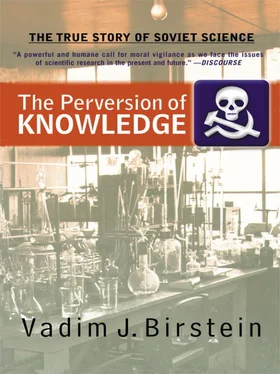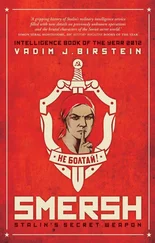iiThe Special Council (OSO), an out-of-judicial tribunal, was established under the NKVD in 1934. At first the OSO was in charge of the decisions on the administrative exile of persons “dangerous for the society,” the imprisonment in labor camps up to 5 years, and the expulsion of foreign citizens from the USSR (p. 274 in Chebrikov, Victor M., G. F. Grigorenko, N. A. Dushin, and F. D. Bobkov (eds.) Istoriya sovetskikh organov gosudarstvennoi bezopasnosti. Uchebnik. “Sovershenno sekretno” [History of the Soviet Security Service. A Textbook. “Top Secret”] (Vysshaya Shkola KGB: Moscow, 1977), 600 pp. (in Russian). Available at www.fas.harvard.edu/~hpcws/documents.htm. The Commissar/Minister of Internal Affairs (or State Security) chaired the OSO, and his deputies were the Council members. In 1937, the 5-year limit was increased to 10 years. In the mid–1940s—early 1950s, the OSO applied sentences of 20 and 25 years, and in 1953, for lifetime imprisonment. The OSO existed under the MVD until 1950. From 1946 till March 1953 there was the OSO under the MGB, and from March 1953 till September 1953 the OSO was under the MVD. It was disbanded on September 1, 1953 (Rossi, Jacques, The Gulag Handbook [Paragon House: New York, 1989], pp. 271-272; Kokurin and Petrov, Lubyanka , pp. 130-131).
Table 1.2 List of the VCheKa/KGB Chairmen, 1917—Present
| Name of the Chairman 1 |
Security Service 2 |
Years |
| 1. Dzerzhinsky, Feliks Edmundovich |
VCheKa/GPU/OGPU |
1917 (Dec.)—1926 (July) |
| 2. Menzhinsky*, Vyacheslav Rudolfovich |
OGPU |
1926 (July)—1934 (May) |
| 3. Yagoda*, Genrikh Grigoryevich |
NKVD |
1934 (July)—1936 (Sept.) |
| 4. Yezhov*, Nikolai Ivanovich |
NKVD |
1936 (Sept.)—1938 (Nov.) |
| 5. Beria*, Lavrentii Pavlovich |
NKVD |
1938 (Nov.)—1945 (Dec.) |
| 6. Merkulov*, Vsevolod Nikolaevich |
NKGB |
1941 (Feb.—July) |
| 7. Merkulov*, Vsevolod Nikolaevich |
NKGB/MGB |
1943 (April)—1946 (May) |
| 8. Kruglov*, Sergei Nikiforovich |
NKVD |
1945 (Dec.)—1946 (March) |
| 9. Abakumov*, Viktor Semyonovich |
MGB |
1946 (May)—1951 (July) |
| 10. Kruglov*, Sergei Nikiforovich |
MVD |
1946 (March)—1953 (March) |
| 11. Ogol’tsov*, Sergei Ivanovich |
Acting, MGB |
1951 (Aug.—Dec.) |
| 12. Ignatiev*, Semyon Denisovich |
MGB |
1951 (Dec.)—1953 (March) |
| 13. Beria*, Lavrentii Pavlovich |
MVD |
1953 (March—June) |
| 14. Kruglov*, Sergei Nikiforovich |
MVD |
1953 (June)—1956 (Jan.) |
| 14. Serov*, Ivan Aleksandrovich |
KGB |
1954 (March)—1958 (Dec.) |
| 15. Shelepin, Aleksandr Nikolaevich |
KGB |
1958 (Dec.)—1961 (Nov.) |
| 16. Semichastny, Vladimir Yefimovich |
KGB |
1961 (Nov.)—1967 (May) |
| 17. Andropov*, Yurii Vladimirovich |
KGB |
1967 (May)—1982 (May) |
| 18. Fyodorchuk, Vitalii Vasilyevich |
KGB |
1982 (May—Dec.) |
| 19. Chebrikov, Viktor Mikhailovich |
KGB |
1982 (Dec.)—1988 (Oct.) |
| 20. Kryuchkov*, Vladimir Aleksandrovich |
KGB |
1988 (Oct.)—1991 (August) |
| 21. Shebarshin, Leonid Vladimirovich |
Acting, KGB |
1991 (August 22) |
| 22. Bakatin*, Vadim Viktorovich |
KGB/MSB |
1991 (August—December) |
| 23. Primakov*, Yevgenii Maximovich |
TsSR/SVR |
1991—1996 (Jan.) |
| 24. Barannikov, Viktor Pavlovich |
MBVD |
1991 (Dec.)—1992 (Jan.) |
| 25. Ivanenko, Viktor Valentinovich |
AFB |
1992 (Jan., one week) |
| 26. Barannikov, Viktor Pavlovich |
AFB/MB |
1992 (Jan.)—1993 (Sept.) |
| 27. Golushko*, Nikolai Mikhailovich |
MB/FSK |
1993 (Dec.)—1994 (Febr.) |
| 28. Stepashin*, Sergei Vadimiovich 3 |
FSK/FSB |
1994 (Febr.)—1995 (June) |
| 29. Barsukov, Mikhail Ivanovich |
FSB |
1995 (July)—1996 (June) |
| 30. Kovalev, Nikolai Dmitrievich |
FSB |
1996 (July)—1998 (July) |
| 31. Putin*, Vladimir Vladimirovich 4 |
FSB |
1998 (July)—1999 (August) |
| 32. Patrushev, Nikolai Platonovich |
FSB |
1999 (August)—present |
| 33. Trubnikov*, Vyacheslav Ivanovich |
SVR |
1996 (Jan.)—2000 (May) |
| 34. Lebedev, Sergei Ivanovich 5 |
SVR |
2000 (May)—present |
1Names mentioned in the text are marked with an asterisk (*).
2Full titles of agencies are given in Table 1.1.
3In 1997–May 1999, Sergei Stepashin was the Interior (MVD) Minister. From May 12, 1999, until August 9, 1999, he was Prime Minister. Vladimir Rushailo succeeded Stepashin as MVD Minister.
4On August August 9, 1999, President Yeltsin appointed Putin Acting Prime Minister. On December 31, 1999, President Yeltsin resigned and transferred his power to Prime Minister Putin as Acting President. In March 2000 Putin was elected Russian President.
5Anonymous, “Putin introduces new spymaster,” BBC News, May 23 (2000).
In writing this book, I have used many formerly secret documents not published until the 1990s. Unfortunately, the originals of most of them are still unavailable and are kept in the secret files of the FSB/SVR archives. All these documents are in Russian, frequently written in a special metaphoric language used by NKVD/KGB officers. Only since 1997 have three fundamental reference books been published in Russian that have allowed me to put the events in Soviet science into historical context. These three texts cover three crucial areas: the history of the Soviet security services, 6the prison and labor camp system, 7and biographies of the main officials during the first two decades of the Soviet secret service. 8
My book also deals extensively with the pernicious effects of Lysenkoism, a body of dialectic Marxist beliefs almost magical in nature, created by Trofim Lysenko, a largely uneducated agronomist. 9Between the late 1920s and the 1950s, every biologist in the Soviet Union had to decide whether to accept Trofim Lysenko’s pseudobiology, which had been approved by the Communist Party and Stalin himself, or whether to follow the dictates of his or her own professional knowledge and ethics. Uneducated Soviet leaders appreciated Lysenko’s denial of the existence of genes as the basis of inheritance (and the chromosomes where the genes are located) and species as the basis of evolution. It was much easier for them to understand Lysenko’s simplified anthropomorphic ideas that individuals within a species “help” each other (i.e., that there is no competition within the same species) and inherit changes from environmental conditions than to deal with the complicated knowledge of “bourgeois” geneticists and evolutionists who were products of the hated intelligentsia.
Analysis of the rise of Lysenko also highlights the resilience and great courage of many scientists who maintained moral and ethical norms against all odds. As in Nazi Germany, scientists in the Soviet Union faced a moral dilemma: Should they follow the demands of the ruling regime and participate in unethical, sometimes criminal research, or should they follow their own consciences and refuse to participate? In the latter case, the decision could cost a scientist his or her professional career, freedom, and even life itself, and could endanger family and friends, as well. However, the regime succeeded in producing some scientists who did not hesitate to fulfill and support any demand of the Party and its secret police. The material presented in Chapters 2 and 3 illustrates this point.
Читать дальше











